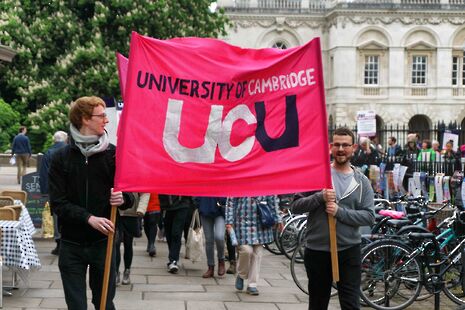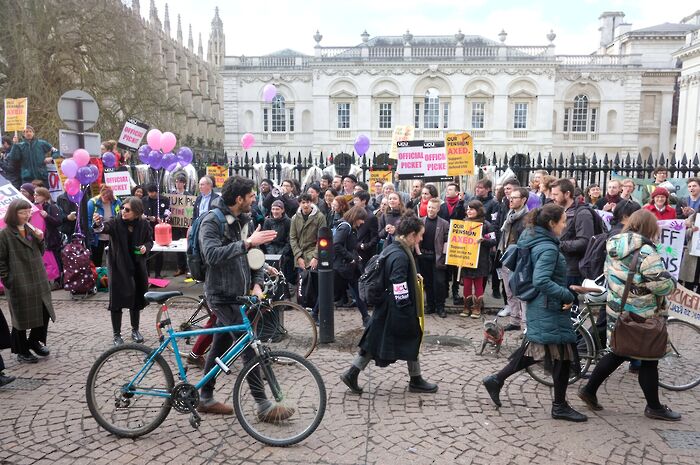UCU members balloted for strike action over issues of pay and conditions
UCU Head of Policy said that they had “no choice” but to ballot for industrial action due to the lack of a satisfactory offer

The national University and College Union (UCU) announced on Friday that 70,000 of its members across 143 UK universities are being balloted for strike action, which will see increased campaigning among Cambridge UCU members for a new wave of staff strikes.
The dispute rests on issues of staff pay, gender pay gap, increasing casualisation of employment in higher education and unsustainable workload demands. Annual pay negotiations between employers and employees last May resulted in a 2% pay rise offered by the Universities and Colleges Employers Association (UCEA).
UCU argues that this offer fails to address the falling value of staff pay in higher education, which has declined in real terms by 21% since 2009. They demand a revised pay offer, as well as guarantees of tackling the gender pay gap, insecure contracts and excessive workloads.
The previous ballot last October concluded with insufficient turnout leading to no actual strikes taking place. In Cambridge specifically, turnout fell short of the threshold by 26 votes, although 79.6% of those who voted supported industrial action.
Nonetheless, last October saw the highest turnout in UCU history for a national pay ballot.
Dr Sam James, Cambridge UCU president, locates last October’s turnout issue alongside unhelpful timing. He noted that ballots arrived outside of term, at a time when many staff were away, with the short window for effective organising at the start of the academic year coinciding with the time when they were at their busiest.
James is optimistic about this term's ballot: “We believe it will be possible in this ballot to replicate the result achieved in October while increasing turnout sufficiently to meet the 50% threshold”.
"We are optimistic that a more extended campaign, in term, to get the vote out between now and the closure of the ballot on February 22nd will ensure that this time it is how UCU members vote, and not merely whether enough of them vote, that will determine the outcome."
James continued that Cambridge UCU seeks to improve turnout by running an active campaign over the next five weeks, with collaboration between members to ensure that all are duly informed of both the ballot itself and the issues at stake.
“It is always a difficult choice to withdraw one’s labour and disrupt one’s students’ studies”, said James, who is also a J.H. Plumb College Lecturer at Christ’s, “but the driving down of working conditions for those who make university education possible presents a deeper threat to students’ long-term welfare and educational prospects.” He added that “it is a threat that staff have a duty as well as a right to resist.”
UCU wrote to vice-chancellors and principals in July requesting their intervention in the annual negotiations, calling on the UCEA to return with an offer that better reflected UCU demands.
UCU head of policy Mark Wadup said that “universities have failed to engage with us in these negotiations”. Emphasising how “staff want these important issues to be taken seriously”, he argued that “we have no alternative but to ballot our members”.
Last year’s staff strikes saw 40,000 members of staff across 64 higher education institutions go on strike for 14 days from February to combat what was perceived as an assault on academic pensions. At the end of November, Cambridge declared its support for universities taking on higher levels of risk in the national staff pensions scheme, endorsing recommendations made by the Joint Expert Panel set up in the wake of the strikes.
 News / Right-wing billionaire Peter Thiel gives ‘antichrist’ lecture in Cambridge6 February 2026
News / Right-wing billionaire Peter Thiel gives ‘antichrist’ lecture in Cambridge6 February 2026 Features / From fresher to finalist: how have you evolved at Cambridge?10 February 2026
Features / From fresher to finalist: how have you evolved at Cambridge?10 February 2026 Film & TV / Remembering Rob Reiner 11 February 2026
Film & TV / Remembering Rob Reiner 11 February 2026 News / Churchill plans for new Archives Centre building10 February 2026
News / Churchill plans for new Archives Centre building10 February 2026 News / Epstein contacted Cambridge academics about research funding6 February 2026
News / Epstein contacted Cambridge academics about research funding6 February 2026










